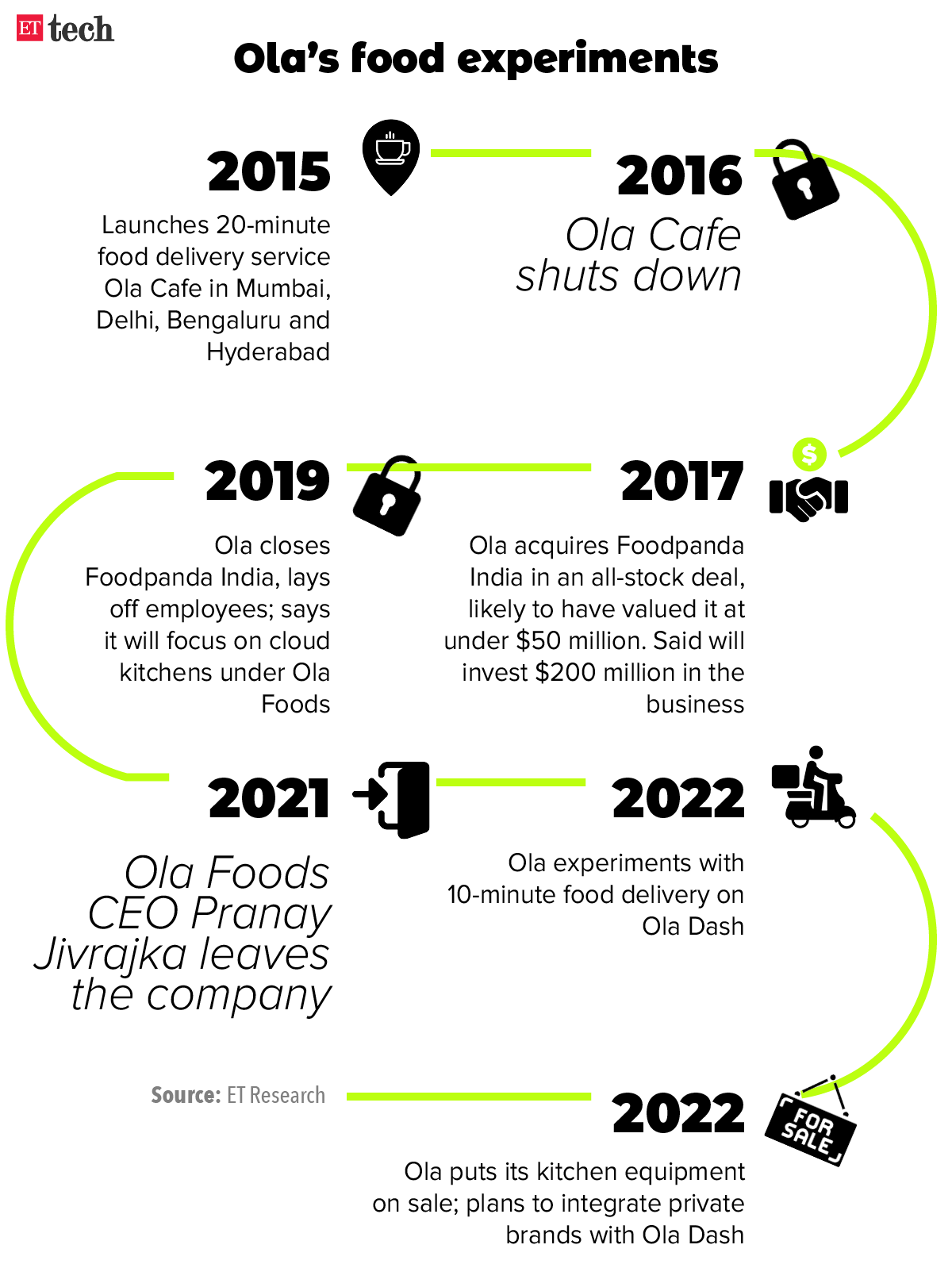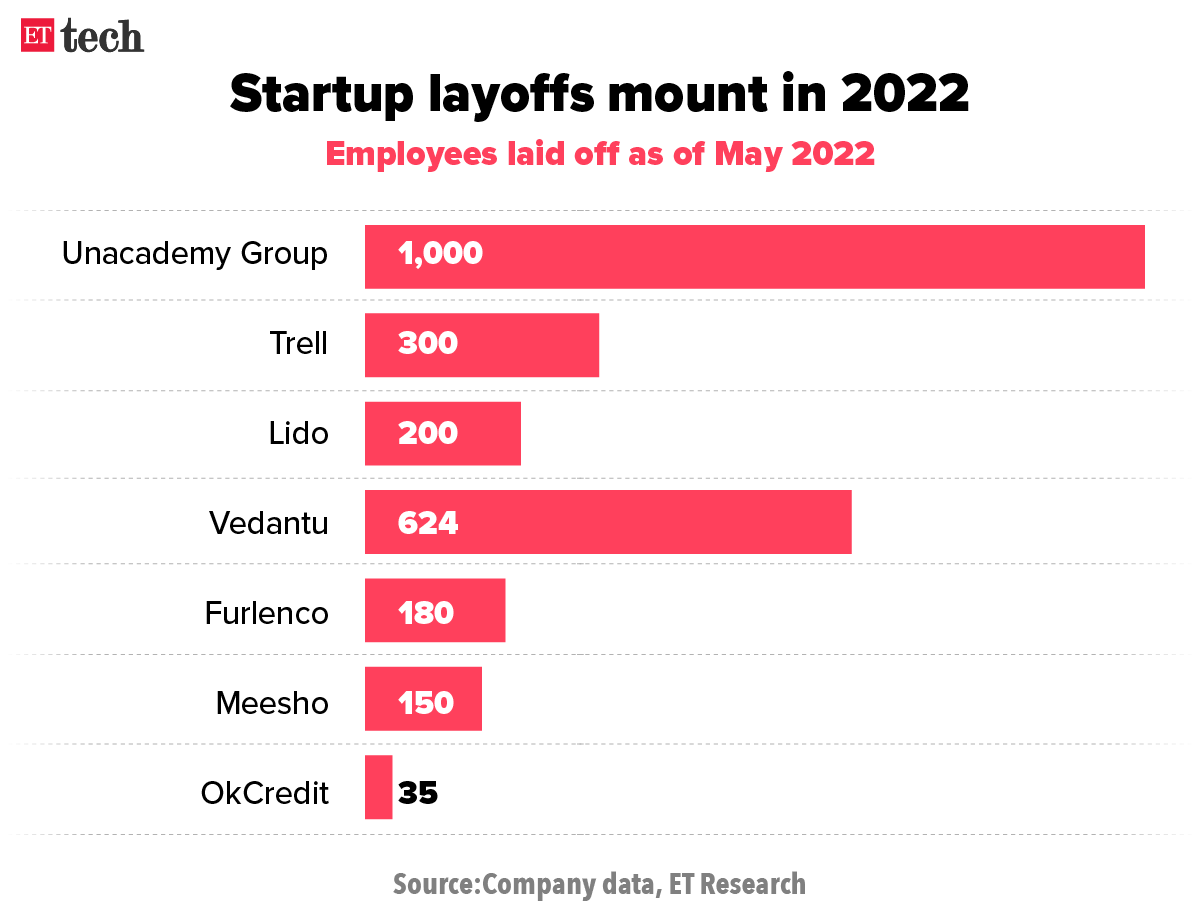Also in this letter:
■ Lawsuit claims Meta prefers H-1B workers, discriminates against US citizens
■ IT firms tap alumni networks for talent as attrition soars
■ Vedantu to lay off another 424 employees
Ola scales down its food business (again)
Ola is once again scaling down its food-delivery ambitions.
Driving the news: The mobility company’s cloud-kitchen business under Ola Foods has cancelled its expansion plans and is looking to sell most of its kitchen equipment at a 30-50% discount, sources told us. We have also reviewed an email sent to prospective buyers on the products up for sale.
Ola Foods runs brands like Khichdi Experiment, Biryani Experiment, Paratha Experiment, Bowlsome, Daily Diner, Nashta Express, Gulpp and That Pizza Place.
Big plans: The Bengaluru-based firm initially planned to expand its cloud kitchen business significantly and run over 500 facilities across the country, according to a source. It operated close to 50 cloud kitchens as of 2020.
So what went wrong? Two sources told us Ola Foods failed to garner traction for its cloud-kitchen brands. “This is not an easy business to run. The management bandwidth was also an issue as the company focuses on Ola Electric,” one of the people said.
Integrating food with Ola Dash: Sources also told us Ola is in the process of integrating some of its cloud kitchen brands with Ola Dash, its 10-minute grocery delivery business. We reported on April 12 that Ola was conducting trials for a 10-minute food delivery service.
Competition: Ola’s experiment with 10-minute food delivery came after Zomato forayed into the category with Instant. Zomato has also been re-evaluating these plans, we reported on May 13, as it hasn’t been able to meet the target time for all orders.
Swiggy is also exploring faster food delivery, though it isn’t clear if it is targeting 10 minutes. Meanwhile, Zepto, the youngest ultra-fast grocery delivery startup, is experimenting with Zepto Cafe, on which it sells ready-to-drink coffee, chai, and packaged snacks.
Food experiments: The food delivery business at Ola has undergone several pivots over the years. Its first attempt was in 2015, when Ola launched a 20-minute food delivery service Ola Cafe, but it was soon shut down.

In 2017 it acquired Berlin-based Rocket Internet’s online food delivery platform Foodpanda India in an all-stock deal. But by 2019 Ola suspended its food delivery business and fired employees to focus on home brands and the cloud kitchen business. It launched Ola Foods in 2019.
Meta prefers H-1B workers, discriminates against US citizens, lawsuit claims

Facebook’s parent entity Meta has been slapped with a new class-action lawsuit that alleges discriminatory hiring practices at the social media firm.
What’s the charge? According to the lawsuit, filed by Purushothaman Rajaram, a US citizen of Indian origin, Facebook allegedly prefers to hire workers on temporary (H-1B) work permits over US citizens as it lets the company pay lower wages.
Rajaram has accused the company of violating federal civil rights law by treating him differently because he is a US citizen.
Rejected twice: Rajaram, who moved to the United States from India, has almost 20 years of experience in solution architecting and delivering enterprise PLM software solutions to Fortune 500 companies. He was considered for employment by Facebook on two occasions in 2020 and claims that he was passed over in favour of a worker with an H-1B visa.
Precedent: This is not the first time that the US company is facing a lawsuit related to alleged discriminatory hiring practices.
In October 2021, Facebook agreed to pay the US Department of Justice over $14 million to settle a similar charge.
According to Rajaram’s complaint, Facebook is an H-1B visa dependent employer, meaning that 15% or more of its US workforce of over 34,600 people are on H-1B visas.
The company hires temporary visa holders either directly or through third-party vendors like Infosys and Accenture.
IT firms tap alumni networks for talent as attrition soars

Faced with unprecedented attrition in a peaking demand environment, India’s IT exporters are tapping into their alumni networks to find the right talent.
HCL Technologies CEO C Vijayakumar told us that alumni networks are one of many lateral talent pools the company is tracking. “Many employees feel like returning and depending on the role and location, we do give them opportunities,” he said.
The IT industry is battling record attrition, with TCS reporting 17.4%, Infosys at 27.7%, HCL Technologies at 21.9%, Tech Mahindra at 24% and Wipro at 23.8%, during Q4 FY22.
Case in point: A Nagpur-based soft skills instructor has been fielding nearly half a dozen calls from recruiters looking to lure her back to a job in the IT services sector for nearly a year now. The techie, 34, once employed as a developer at one of India’s largest IT services providers, quit in 2015 to start a new career and has had no contact with the IT industry since.
Then, in mid-2021, hiring consultants began to bombard her with calls, looking to draw her back to her old employer or other similar companies.
“Most of the calls come from HRs looking up my old (not updated) profiles on job platforms and CVs submitted to the companies prior to 2015,” says the exasperated engineer who routinely receives three to four such calls every week.
Vedantu to lay off another 424 employees as capital becomes scarce

Edtech unicorn Vedantu said it is laying off another 424 employees – about 7% of its workforce – just days after sacking 200 contractual and full-time employees amid falling demand for online education.
Statement: CEO and founder Vamsi Krishna wrote in a blog post that the company decided to layoff employees “as capital will be scarce for upcoming quarters” because of inflationary pressures from the war in Europe, impending recession fears, and Fed rate interest hikes.
He added, “With Covid tailwinds receding, schools and offline models opening up, the hyper-growth of 9X Vedantu experienced during the last two years will also get moderated. For long term sustenance of the mission, V would need to adapt too.”
Cost-cutting: On May 5 we reported that Vedantu had laid off about 120 contractual and 80 full-time employees. The company has also been focusing on reducing the cost of its courses to manage the tapering demand for online education as offline learning centres open up.
Season of layoffs: Several Indian startups, including Unacademy, Lido Learning, Meesho, Trell and Furlenco have laid off employees over the past couple of months, amid a downturn in funding.

On April 28, we reported that more than 1,800 contractual and full-time employees had cumulatively been fired from various startups as investors began to ask high-growth companies to go back to basics — chase profits and reduce their cash burn.
Also Read: Edtech’s offline push continues with Unacademy Centres
TWEET OF THE DAY
PhonePe set to buy WealthDesk, OpenQ for $75 million

Walmart-owned PhonePe is acquiring two wealth management companies WealthDesk and OpenQ as it looks to boost its play in the wealth management and distribution space.
Details: The company is expected to acquire WealthDesk for roughly $50 million and OpenQ for $25 million, sources told us, as it looks to unlock new revenue streams and diversify its offerings for users of its payments services.
PhonePe said WealthDesk’s founder and team will work as a part of the PhonePe group and both platforms will remain independent.
It added that OpenQ would be instrumental in creating its wealth ecosystem.
New battleground: Financial services is the next big battleground, after digital payments, for companies such as PhonePe, Amazon, Google and Paytm.
PhonePe already has a mutual fund distribution licence. It applied for a mutual fund licence with the Securities and Exchange Board of India (Sebi) in December 2021.
Its cofounder and chief executive Sameer Nigam previously told us he expects 40%-45% of PhonePe’s revenues to come from financial services.
On Tuesday we reported that the RBI denied a banking licence to Chaitanya India Fin Credit, owned by Flipkart founder Sachin Bansal, denting his ambition of owning a bank.
ETtech Done Deals
■ Flipkart-backed fresh fruits and vegetable supply chain startup Ninjacart has raised $9 million (Rs 69 crore) from South Korea-based STIC and UK-based Mainstream Digital at a valuation of $812 million (Rs 1,050 crore), according to regulatory filings. STIC is an existing investor in Ninjacart.
■ Direct-to-consumer (D2C) brand MasterChow has raised $1.2 million in a funding round led by Anicut Capital, an Indian investment firm that deals in alternative assets. The round also saw participation from Mumbai-based WEH ventures and D2C-focussed fund Fluid ventures, among other marquee founders and angel investors.
■ D2C beauty and wellness brand Wow Skin Science announced it has raised primary growth capital from Singapore’s sovereign wealth fund GIC. The company declined to comment on the amount raised and the valuation it racked up in the new round.
■ D2C women’s activewear brand BlissClub said it has raised $15 million in a new funding round led by Eight Roads Ventures and Elevation Capital. This comes less than a year after the Bengaluru-based startup raised $2.25 million in May 2021.
■ Treasury management and infrastructure platform Coinshift has raised $15 million led by Tiger Global. The company will use the funds to develop its product and technology. It will launch its latest version in beta next week, which will be available via a waitlist.
Other Top Stories By Our Reporters

VPN firms ‘free to leave India’, says MoS: Virtual Private Network (VPN) service providers that do not adhere to the latest cyber-security guidelines issued by the Indian Computer Emergency Response Team (Cert-In) are “free to leave India”, Minister of State for Electronics and Information Technology Rajeev Chandrasekhar said on Wednesday.
Slice looks to diversify beyond credit cards: Fintech unicorn Slice is shifting its focus to Unified Payments Interface (UPI) and other payment methods on its app, as it looks to diversify its credit card business, founder and chief executive Rajan Bajaj said.
Amazon to help offline stores set up digital storefronts: Amazon has unveiled a new initiative in India called Smart Commerce that will help offline retailers create their own digital storefronts, in addition to selling on Amazon’s India marketplace.
Vedanta-Foxconn talks with Karnataka stuck over sops: Vedanta-Foxconn’s discussions with the Karnataka government on setting up a chip manufacturing unit in the state have hit a roadblock over incentives, people in the know told us. The joint venture is willing to invest $20 billion but wants 20% of the investment value, or $4 billion, back in the form of incentives and concessions, the sources said.
Global Picks We Are Reading
■ 15-second shopping: TikTok’s e-commerce ambitions are rising (Rest of World)
■ Inside the race for a car battery that charges fast — and won’t catch fire (The Washington Post)
■ How a trash-talking crypto founder caused a $40 billion crash (The New York Times)
Today’s ETtech Morning Dispatch was curated by Zaheer Merchant in Mumbai and Judy Franko in New Delhi. Graphics and illustrations by Rahul Awasthi.
























